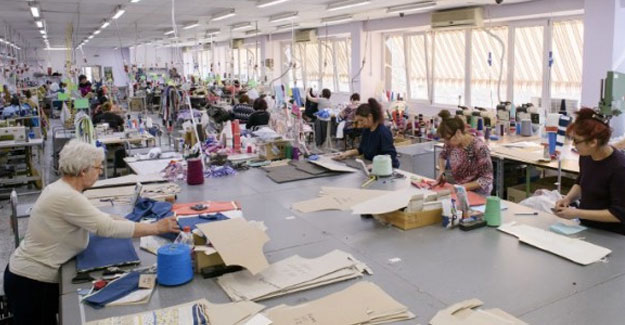
Bulgaria's Textile Workers On The Poverty Line
Bulgaria's textile workers face difficult working conditions and the lowest minimum wage in the EU. According to Euronews, Bulgaria's textile and apparel factory workers earn poverty wages, and global competition from low cost producing countries in Africa, Asia and Turkey mean that East European factories remain under pressure to drive down costs. Many international brands have outsourced their production to Bulgarian businesses like Pirin-Tex. The company produces a lot of items for Hugo Boss. The workers here are exceptionally fast, needing just five seconds to hem a trouser leg. The pressure on employees remains intense. According to factory sources, only 11 out of the site's 1800 workers are able to meet their production quota. "Laws for human beings or robots?" Pirin-Tex is located in the small southern Bulgarian town of Gotse Delchev, in the heart of the country's garment industry. Kostadin, a union leader, slams the factories current operating practices. "On average, workers are only able to finish about 60% of their required tasks every time. Depending on their seniority, the average net wage is between (650 and 700 leva) 320 and 350 euros," he says. Elena, a textile worker at Pirin-Tex is equally critical: "Did Bulgarian politicians pass laws for human beings or was it for robots? We work non-stop: with this system, our employer has more or less been able to implement a forced system of work." Elka, another worker at the factory says: "I think our colleagues in western Europe would just laugh if they heard about what we earn. They would not believe it. It's true, it's better to laugh than cry... But: are we second class European citizens? Are we bad tailors or dressmakers? Do we eat less than our colleagues in western Europe?" "There is a big paradox, in Bulgaria. We try to escape low wages, we run away from our bad living conditions and we head abroad, to work in the UK, in France or elsewhere... But nobody from abroad wants to come and work here.. and if a foreign entrepreneur wants to invest in Bulgaria, they are unable to find enough manpower," Kostadin adds. Leaving Bulgaria for better pay Around 40,000 people live in Gotse Delchev and its surrounding villages. According to the town's mayor, some 2500 people from the area are currently working abroad. Most are thought to be in Western Europe, employed in the farming, building and the health service sector. Galina recently left Gotse Delchev for the UK. Presently living in London, she left her family in Bulgaria to sow cheap sweaters instead of expensive suits. "The stress was huge in Bulgaria. I got (530 to 560 leva) 260 to 280 euros. Here in London I get (1600 pound sterling) 1800 euros per month. - In Bulgaria, my employer did not believe me when I was sick, although I had to have a drip-feed and buy medicine to keep going... I've been in the UK for three months and already feel better. Back in Bulgaria, the workload was way too much," she says. As one of Pirin-Tex's main customers, Hugo Boss regularly carries out social audits at the textile factory in Gotse Delchev to evaluate operating procedures and working practices. The results are deemed to be good. Management also insist the company has an excellent reputation in Bulgaria, compared to other firms where conditions are much worse. "The profits for companies in the garment industry are too low to enable them to pay a lot to their employees. As a result, for three years now, people have left in large numbers, migrating elsewhere. In the past three years, on average some 600 people have left the company every year, mostly heading to the United Kingdom, to Germany, some have gone to Sweden, and some even to Spain. Bulgarian producers like ours get only about 5-7% of the retail price. That's not enough, actually. It's such a small part, that people working in production, be it in Bulgaria, Romania, Serbia, Macedonia or Albania, cannot build a decent life. On the one hand, international brands insist that international, let's say European standards should be respected and implemented, in regard to social (work) conditions. On the other hand, those brands do not want to pay accordingly to meet those necessary requirements," insist management officials. Bulgaria's minimum wage is the lowest in the EU. Despite a rise of 10% in January, the current basic salary is only 286 euros per month. That is lower than the 440 euros in neighbouring Romania and way below the minimum wage in France, which currently stands at 1500 euros. Moving production abroad? On the whole, the outlook for the textile and apparel industry in Bulgaria looks gloomy. Textile producers in Bulgaria and Romania harbour ambitions to move production abroad. "We will stay here, on this site... You do not give up such a site with 1800 staff just like that. The know-how we have built up here is precious to us. But it could happen, of course, that one day we will be forced to open a second site in another country, that could be somewhere in Africa or in Central Asia... in order to get an alternative, to get a second leg in order to keep our business going in the medium and long-term," according to Pirin-Tex officials. The company is exploring the possibility of opening a second site in either Senegal or Uzbekistan. A minimum hourly rate for all the EU With this year's European Parliament elections in mind, local union members in Gotse Delchev have their own ideas on what needs to be done to trigger change for the better. Textile workers are demanding standard hourly minimum wages across the European Union.
Textile Excellence
If you wish to Subscribe to Textile Excellence Print Edition, kindly fill in the below form and we shall get back to you with details.













